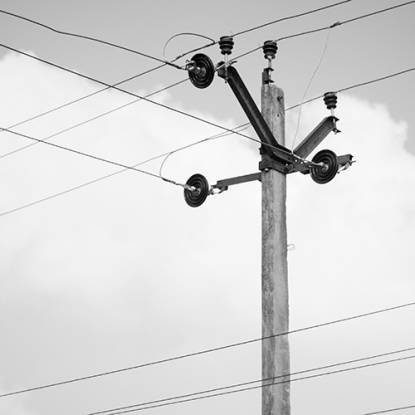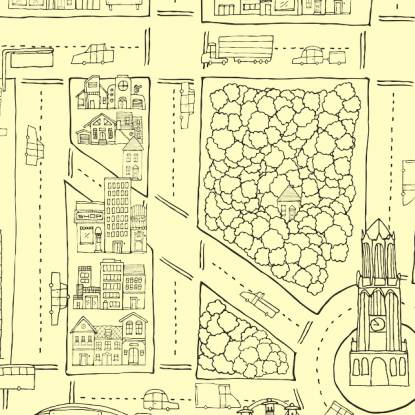Sound Voice: Voice Loss and Identity
About the project
- Hannah Conway
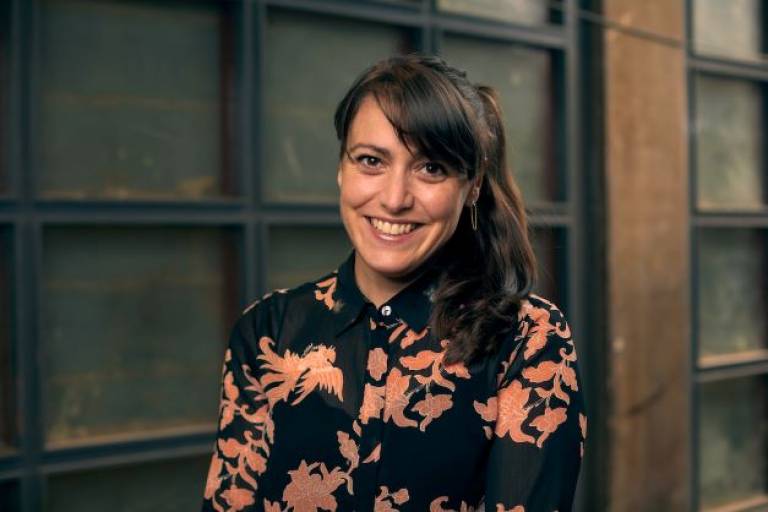
Internationally recognised for her work with some of the world’s leading opera houses and orchestras, Hannah Conway has led projects in 18 different countries, carving a path as a composer, presenter and music director. At the heart of her work always is intense collaboration and musical input from communities and young people. She has composed operas in 12 different languages, devised and presented BBC Proms and received commissions from the London Symphony Orchestra, Glyndebourne, City of Birmingham Symphony Orchestra, BBC Concert Orchestra and Royal Opera House. Recent projects include Dare To Dream, an opera for 1800 singers (Garsington Opera/Royal Albert Hall), Tale of Two Dragons for the BBC Singers, the promenade opera Towards Another World (English National Opera and V&A museum), A Young Known Voice (Academy of Ancient Music/Barbican) and opera, Water In The Desert, (Cranleigh/Cultural Ministry, Abu Dhabi). The Freedom Game opera (2015) received its premiere at the Royal Albert Hall for 1200 performers and Beautiful World (2016) won the Education Middle East Performing Arts Award at the National Theatre, Abu Dhabi. She is also Artistic Director of Streetwise Opera, an award-winning company working with people affected by homelessness. As a guest artist, she has collaborated with the Chamber Orchestra of Europe, Opéra de Dijon, Royal Concertgebouw Orchestra, Luxembourg Philharmonie, LʼOrchéstre de Paris, Muziekcentrum Van De Omroep, and Melbourne Symphony Orchestra. She has directed opera residencies in Serbia, France and Sweden, and delivered artistic consultancy for the Royal Danish Opera, Het Muziek Theater, Fundacja Nowa Orkiestra Kameralna, Amsterdam Sinfonietta, De Nederlandse Bach Vereniging and Songbound in Mumbai, India. Hannah moderates for the EU Commission and has guest lectured at the Royal Academy, Royal College of Music, Hague Conservatorium and at Cambridge University where she gained her MA (1995-9). She has also adjudicated BBC Young Musician competition and presents for BBC Radio 3.
- Dr Thomas Moors
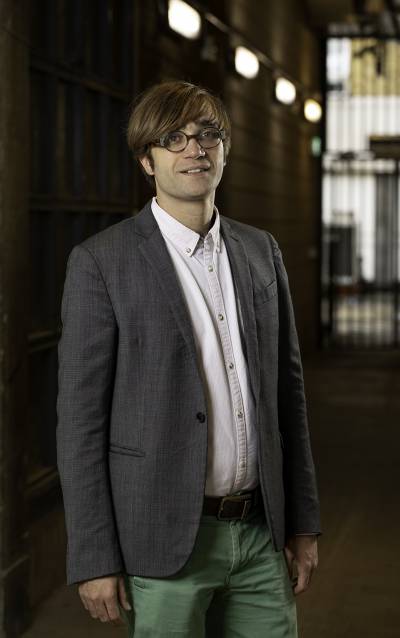
Thomas Moors is a Belgian doctor, working in London, active in otorhinolaryngology (Ear, Nose and Throat or ENT) with a special interest in voice pathology. Driven by his passion for music, he has gathered a team of opera singers, actors, speech therapists and laryngectomy patients. Together they incorporate singing, acting, beatboxing and art into post-laryngectomy rehabilitation and social reintegration. For his charitable work and achievements he received the Points of Light Award from the British Prime Minister, Theresa May in March 2017. Since his completion of the Master Module Choral Conducting, Leadership and Communication (IOE, UCL 2014) he has developed a longstanding and successful collaboration with Dr Evangelos Himonides, IOE, UCL leading to a Beacon Bursary by UCL Culture (2017) and Performance Lab Seed Fund by UCL Culture (2019).
- Shout at Cancer
Shout at Cancer is the only charity in the world that is specialising in speech recovery and social reintegration after laryngectomy, via the use of singing, acting and beatboxing techniques. They run a choir with their members and thanks to concerts they do public education and public engagement to explain the layered impact after the operation. They have performed in prestigious venues (Belgian Embassy in London, Royal College of Surgeons in London, The Barbican as part of the Global Health Film Festival in London, The Victoria and Albert Museum part of the exhibition Opera: passion, power and politics and at Theatre at The Sea an international festival in Ostend, Belgium), the choir has enabled us to spread our inspirational message to the laryngectomy community and to a broader audience thanks to numerous coverage on national television in the U.K., Belgium and France and global news services like BBC world and The Guardian. As a result, we bring positive attention towards a small and scattered group, that had been relatively overlooked in research and our society before. In 2020 the choir was featured in the documentary 'Can you hear my voice?' (90 min) by internationally awarded film producer Bill Brummel, LA, USA.
- Prof Martin Birchall
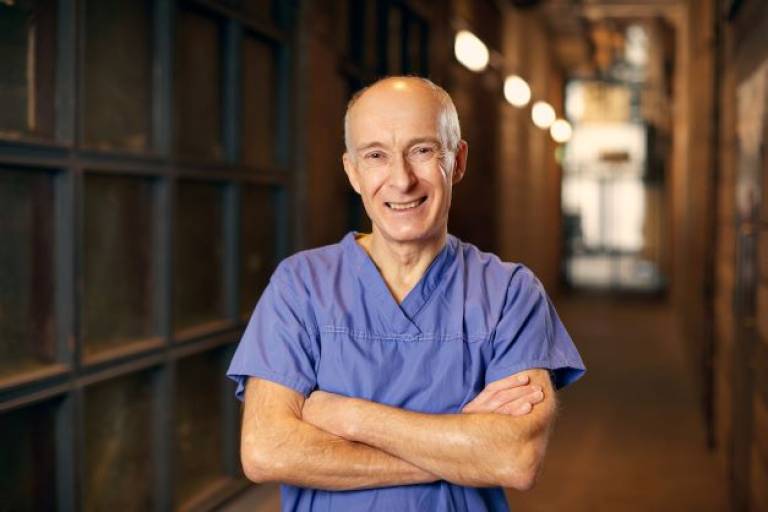
Martin Birchall is UCL's Professor of Laryngology and a Consultant in ENT Surgery at the Royal National Throat Nose and Ear Hospital. He is one of the leading academic Otolaryngologists in the world as measured by the impact of his research papers. A specialist in disorders of voice, swallowing and breathing, he has pioneered the use of stem cells and tissue engineering in surgery.
Meet the project team
Can you tell us a bit about your project?
Sound Voice: Voice Loss and Identity is a project developed by Hannah Conway, Dr Thomas Moors, Katherine Wilde and Professor Martin Birchall.
The project was designed to answer a simple question: what is the intrinsic value of the human voice? What is a voice and what happens when it is gone? These questions were central to Professor Birchall’s ROBOVOX research team and associated colleagues at Bristol Robotics Laboratory as they embarked upon the development of an implantable larynx.
We drew together an interdisciplinary group of professionals (from biomedical science, technology, healthcare, neuroscience and education sectors) together with people with lived experience of voice loss. People who had lost their voices were affected by a broad range of serious illnesses including Parkinson’s disease, motor neurone disease and throat cancer. Partners and contributors from three continents, seven countries and multiple regions of the UK took part in the project.
Who were your community collaborators and how did you work together?
We collaborated with several community organisations; Sing For Joy (London) and Skylarks (Suffolk) Parkinson’s choirs, Shout At Cancer laryngectomy choir (UK wide), and individuals and their families at Royal Preston Hospital.
We worked with their participants and directors to form joint ownership of the project. Members and staff from the above organisations participated in the project and formed newly established ‘project groups’ that included a mix of people from all cross-sector professional and community group partners.
What were your aims going into the project, and how did it develop from there?
The Researcher: Professor Martin Birchall
As clinicians (laryngologists, speech therapists) managing problems faced by those who had altered or lost voice, we have intrinsic preconceptions and biases about the impact these changes have on a person. These come from our training, and ongoing reinforcement comes from a lack of effective communication with patients and continuing, traditional, medical education. When designing new technologies and treatments, therefore, the aims and specifications are automatically loaded with these same one-sided views and beliefs. Since millions may be invested in such new technologies, it is critical that they address, from as early a stage in development as possible, the actuality and learned reality of those who they are intended to help.
Through serendipity, and from a latent sense that ‘all is not right here’, our group connected with the artists and thinkers of Sound Voice and tried a new way of gaining this essential understanding of voice loss/alteration and what it truly means for people. The project drew both clinical and scientific engineering project team members into a vibrant, musical and descriptive interaction with those with significant voice problems. The result was personal growth, learning and, indeed, fun, for all parties.
Importantly, we were able to reshape the aims and specifications of the soft robotics devices we were developing. Further, we have field-tested a method of making medical technology ‘user-led’ that may be applied widely in biomedical research.
The Lead Artist: Hannah Conway (composer)
When I first met Martin and his team, they were unsure of how arts-based activities could help them better understand the needs of their client group for whom they sought to develop ground-breaking new solutions and technology. I am grateful in particular for Martin’s trust and continued enthusiasm and honest reflections throughout the project.
Hazel Gould (writer) and I led multiple creative participatory workshops including music composition, singing, creative writing/poetry and dramatic improvisations. The sessions spanned across many months.
We ran the workshop sessions with mixed groups of cross-sector professionals and people with lived experience of voice loss and their families, creating a democratic and creative space for people to exchange experiences, stories, research and to have fun! In addition, we spent many hours in conversation with selected individuals, with whom we developed more in-depth relationships and understanding.
We took all groups and contributors through an artistic process to co-create six individual chamber works, each deeply personal and distinct. Each work enables audiences to reflect upon the wider issues of voice and identity – universal themes which transcend demographic groups or background. The professionals involved from all sectors reported transformation in their thinking and practice as a result of taking part in the project. We have discovered immense value in the arts as a catalyst for innovation cross-sector; when professionals and people with lived experience meet together in an artistic space, hierarchies disappear, connections are deep, and generous trust and respect develop fast through music-making and shared creativity.
The works created and ‘making of’ films can be viewed on the Sound Voice website.
How you have responded to the COVID-19 pandemic – what this has meant for your project?
The pandemic happily enabled us to work much more deeply and over a far greater period of time! We worked remotely for all creative workshops and were able to access more people across more organisations and develop much more interesting partnerships. Professionals and people with lived experience of voice loss from all of the UK and internationally were able to join the project.
What has changed for you through the process of this project?
Martin and I now have ongoing collaborations and public engagement work together. Sound Voice is now officially established as a new company, working with high profile research projects to deliver PPIE and to explore how artistic practice can benefit accelerated thinking and transformation of practice cross sector.
The work we’ve created as part of this inaugural project is engaging audiences as it tours to different venues in the UK. Sound Voice CIC continues to work with researchers across many faculties at UCL. We are currently running projects in collaboration with the biomedical science, healthcare, neuroscience, education and engineering departments.
 Close
Close



